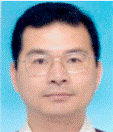课程名称:Discrete event modeling and supervisory control theory
任课教师:DrRong SUNanyang Technological University,Singapore
课程时间:2018年7月13日,7月15—20日上午09:00—12:00
课程地点:主楼III-327
 教师简介:DrRong Su is currently an associate professor (with tenure) in the School of Electrical and ElectronicEngineering at Nanyang Technological University, Singapore. He received his Ph.D. degree in Systems and Control from University of Toronto in 2004.
教师简介:DrRong Su is currently an associate professor (with tenure) in the School of Electrical and ElectronicEngineering at Nanyang Technological University, Singapore. He received his Ph.D. degree in Systems and Control from University of Toronto in 2004.
His research and teaching interests are in the areas of Discrete-Event Systems (DES) (supervisory control, model-based diagnosis, cyber security analysis,simulation), Multi-Agent Systems (MAS) (formation control, output regulation, sliding mode control), Planning and Scheduling with Applications in Smart Nation Initiatives (smart manufacturing, intelligent transportation, smart buildings), and has over 150 publications. He received the Outstanding reviewer for Automatica in 2016 and Outstanding reviewer for IEEE Transactions on Control of Network Systems in 2013, is a senior memberof IEEE. He served as associate editor for Journal of Discrete Event Dynamic Systems: Theory and Applications, Transactions of the Institute of Measurement and Control、Journal of Control and Decision,and IEEE Control Systems Society (CSS) Conference Editorial Board (CEB). He is currently an associate editor for Automatica.
课程摘要:
This course will embark on an journey to explore discrete event modeling and supervisory control theory. The term of "Discrete Event System" was coined by Prof Larry Ho at Harvard University, aiming to describe systems driven by discrete events instead of (continuous) time only.Recently, researchers start to apply them to multi-agent robotic systems such as autonomous vehicles and UAVs. This course will give an overview of discrete event modeling in terms of regular languages and finite-state automata, and then introduce several supervisory control architecture in the Ramadge-Wonham paradigm, which was originated by Peter Ramadge (at Princeton University) and Murray Wonham (at University of Toronto), with realistic case studies to illustrate their usefulness.
课程内容:
(1) Discrete event modelling – component models and formal requirements.
(2) Centralised supervisory control theory
(3) Modular supervisory control theory
(4) Distributed supervisory control theory
(5) State-based control (which is close to Petri net based theory)
(6) DES based performance optimisation – modelling and task scheduling
(7) (optional) Hierarchical supervisory control
(8) (optional) Fault diagnosis and opacity analysis



